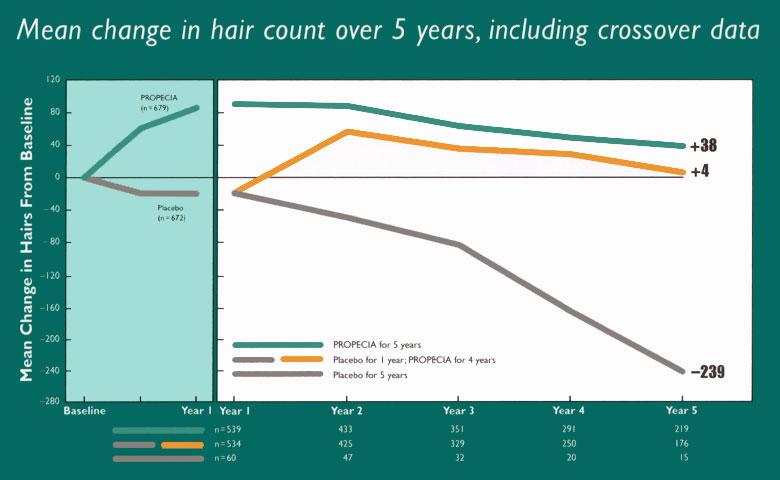What Do You Mean By Finasteride Slowing Hair Loss Down?
I understand that finasteride can stop hair loss or slow it down. When you mean slow it down, does that mean instead of permanently losing 10 hairs a year you only lose 5 for example. How slow does the hair loss really become on finasteride in terms of numbers and actual hairs lost? Thank you.
There is no absolute cure for genetic balding. Taking a medication like finasteride (Propecia) slows down the hair loss. Perhaps it is best explained with the graph where you see a group of men who never took Propecia (the placebo group) to another group who did take the medication. The group that took Propecia collectively have less hair loss.
Unfortunately, I don’t have the actual data, but the visual graph should be helpful. Click to see the larger size:


If there are no studies done after the 5 year mark, who is to accurately know if the line goes up again or continues downward or just plateaus out and stays the same for the next 10 to 20 years, and people just hold on to what they have?
Where is the line for men who take propecia and lose more hair? The only time I experienced serious hairloss is during and several months after taking propecia.
each case is individual period!
I wish longer study was done then just five years to accurately know. However, from what my derm has told me and from what I have read on other forums, individuals who have been taking propecia for over ten, fifteen, and even twenty years have done well apparently.
In terms of propecia causing more hair loss, could it just be the drug didn’t work and people were still losing hair and blamed it on the drug?
Chris, that would make sense if I continued to lose hair long term after stopping the drug. However, I only lost the hair for about 3 months after using the drug a few different times. After roughly 3 months, my hair stopped being destroyed.
The bottom line is propecia can kill healthy hair.
This graph represents the mean average. If someone on the study did lose lots of hair on propecia they would be an outlier and be listed on the study results (but their data has influenced the average on this graph). What this tells you is that propecia ‘in general’ results in much slower hair loss over a 5 year period (i.e. It worked for the majority of men). The study can’t be indefinite or they’d never publish results. It’s difficult to recruit study participants who will agree to be studied for 20 years or more or who stick to the testing protocol. Those on a placebo might want to know for sure they are prescribed the drug for instance rather than losing their hair.
For what it’s worth many hair surgeons like Dr Rassman have seen ongoing good results on 10-15 year patients. Especially those who started younger/at first sign of hairloss.
Dan:
From most of the people I have spoken to who do take the drug, they have all noticed an improvement. Most people tell me the drug has thickened their hair up or maintained what they have. Rarely do I hear of an individual having a bad experience with the drug in terms of losing hair. I have been around hair loss message boards for years and have read of some bad cases associated with drugs (the ones we all know about, effecting only 2% of men which I think is rubbish, it does effect more in my opinion). Anyways, the ones who have lost more hair on the drug are the ones who are far and few in-between. But I do feel for those guys because so far finasteride is the only thing out there helping us guys losing hair.
Did you regrow you hair back after you stopped the drug Dan?
Absolutely not. There was no regrowth. Taking propecia is one of the worst decisions I have ever made. I feel like a sucker for falling for the marketing ploy that one should start propecia as soon as possible because it is better at maintaining hair, and that it would either maintain or regrow hair. I should have just left it alone.
As far as I’m concerned, Propecia is probably the worst thing a man can take for his hair.